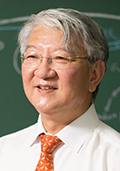What Happened in Asia
Prof. Sang Yup Lee Elected as a Foreign Member of the Royal Society
View : 958 Date : 2021-05-07 Writer : PR Office

< Distinguished Professor Sang Yup Lee >
KAIST Vice President for Research Distinguished Professor Sang Yup Lee was elected as a foreign member of the Royal Society in the UK. On May 6, the Society announced the list of distinguished new 52 fellows and 10 foreign members who achieved exceptional contributions to science. Professor Lee and Professor V. Narry Kim from Seoul National University are the first foreign members ever elected from Korea.
The Royal Society, established in 1660, is one of the most prestigious national science academies and a fellowship of 1,600 of the world’s most eminent scientists. From Newton to Darwin, Einstein, Hawking, and beyond, pioneers and paragons in their fields are elected by their peers. To date, there are 280 Nobel prize winners among the fellows.
Distinguished Professor Lee from the Department of Chemical and Biomolecular Engineering at KAIST is one of the Highly Cited Researchers (HCRs) who pioneered systems metabolic engineering and developed various micro-organisms for producing a wide range of fuels, chemicals, materials, and natural compounds.
His seminal scholarship and research career have already been recognized worldwide. He is currently member of several academics including Korean Academy of Science and Technology, National Academy of Engineering Korea, American Academy of Microbiology, the World Academy of Sciences, and National Academy of Inventors USA. He is also fellow of American Institute of Chemical Engineers, Society for Industrial Microbiology and Biotechnology, American Institute of Medical and Biological Engineering, and Sigma Xi, It is notable that he is one of 13 scholars elected as an International Member of both the National Academy of Sciences (NAS) and the National Academy of Engineering (NAE) in the US. With this foreign membership to Royal Society, he added one more accolade of being the first non-US and British Commonwealth scientist ever elected into all three most prestigious science and engineering academies: the NAS, the NAE, and the Royal Society.
He has also contributed significantly to our biotechnology community through serving as the Co-Editor-in-Chief of Metabolic Engineering (Elsevier) and Biotechnology Journal (Wiley), Editor-in-Chief of Discover Chemical Engineering (Springer Nature), Editorial Board Member and Editor of PNAS, and Associate Editor of Biotechnology and Bioengineering (Wiley) and Bioprocess and Biosystems Engineering (Springer) among others.


